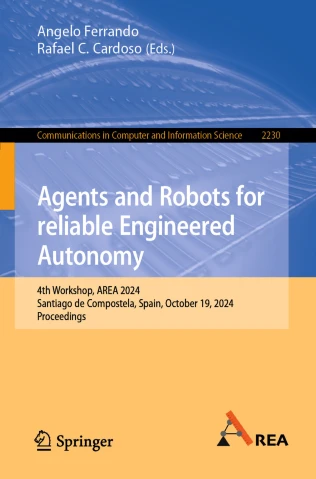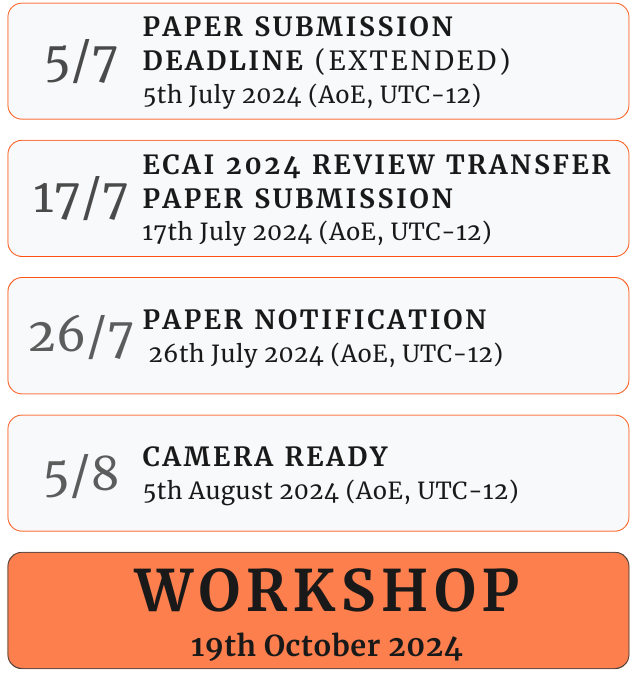AREA 2024
4th Workshop on Agents and Robots for reliable Engineered Autonomy
19th October 2024 at ECAI 2024 - Santiago de Compostela


| Time | Activity |
|---|---|
| 09:00 - 09:10 | Opening Remarks |
| Session 1: Autonomous Systems and Planning | |
| 09:10 - 09:30 | "Risk-Aware On-the-Fly Solving of Physical Vehicle Routing Problems" by Jáchym Herynek and Stefan Edelkamp |
| 09:30 - 09:50 | "Planning with Non-Deterministic Actions in Jason" by Josh Blondin and Babak Esfandiari |
| 09:50 - 10:10 | "Attentive A* for Visual Cue based Path Planning in Complex Environments" by Abhay Kumar, Kunal Verma, Armaan Garg, and Shashi Shekhar Jha |
| 10:10 - 10:30 | "Reason Logically, Move Continuously" by Andrea Gatti |
| Break | |
| 10:30 - 11:00 | Coffee Break |
| Invited Talk | |
| 11:00 - 12:00 |
Eva Onaindia - AI Planning for Behavior Inference in Hybrid Systems
Abstract: A Hybrid system (HS) exhibits both continuous and discrete behaviors, and it is an essential tool for modeling complex real-world processes, such as those in robotics, automotive systems, and aerospace engineering. Continuous dynamics are typically governed by equations describing the evolution of the system state over time, and discrete dynamics are characterized by abrupt transitions between modes of operation, often representing control decisions or the logic of an automated system. A hybrid trajectory is a sequence of transitions that describes a particular execution of an HS over time. A sequence of observations collected from an HS, such as sensor readings of the system variables, reflect the behavior of the system. By generating a hybrid trajectory that matches a given sequence of observations, we can trace the operations of the system, identify the underlying factors leading to the observed behavior, and verify that our understanding of the system matches its operations. In this talk, we will discover the power of AI planning technology to diagnose, understand and verify the behavior of an HS and compare its performance with model-checking tools for safety validation in hybrid systems. |
| Session 2: Agent-based Systems and Robotics | |
| 12:00 - 12:20 | "Agents as a Design Paradigm for Robotic Systems Leveraging ROS and Gazebo" by Valeria Seidita and Antonio Chella |
| Break | |
| 12:30 - 14:00 | Lunch Break |
| Invited Talk | |
| 14:00 - 15:00 |
Aniello Murano - Formal Aspect of Strategic Reasoning
Abstract: Strategic reasoning is essential in numerous fields, including game theory, artificial intelligence, economics, and cybersecurity, as it involves devising and analyzing strategies to achieve goals in both competitive and cooperative settings. This talk will explore the formal aspects of strategic reasoning, focusing on the mathematical and logical underpinnings that enable precise and effective strategy formulation. Key model frameworks, such as Alternating-time Temporal Logic (ATL) and Strategy Logic, one of the most powerful logic for strategic reasoning, will be discussed to illustrate their roles in understanding and predicting strategic interactions. |
| Session 2: Agent-based Systems and Robotics | |
| 15:00 - 15:20 | "Verification-Oriented Specification of Multi-Agent Interaction Patterns" by Alberto Tagliaferro, Livia Lestingi, and Matteo Rossi |
| Break | |
| 15:30 - 16:00 | Coffee Break |
| Session 2: Agent-based Systems and Robotics | |
| 16:00 - 16:20 | "Bid Intercession to Unlock Human Control in Decentralized Consensus-based Multi-Robot Task Allocation Algorithms" by Victor Guillet, Christophe Grand, Charles Lesire, and Gauthier Picard |
| Session 3: Human Interaction and Verification | |
| 16:20 - 16:40 | "Evaluation of Human Interaction with Fleets of Automated Vehicles in Dynamic Underground Mining Environments" by Olga Mironenko, Hadi Banaee, and Amy Loutfi |
| 16:40 - 17:00 | "Signal Sparsity Considerations for Using VAE with Non-Visual Data: case study of proximity sensors on a mobile robot" by Oksana Hagen and Swen Gaudl |
| 17:00 - 17:20 | "Centralized Stochastic Multi-Agent Pathfinding under Partial Observability" by Guy Shani, Roni Stern, Itay Raveh, and Inon Katz |
| 17:20 - 17:30 | Closing Remarks |
